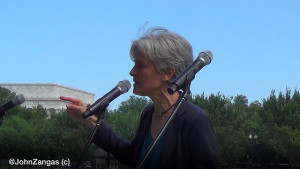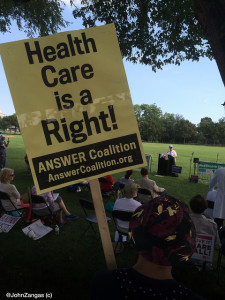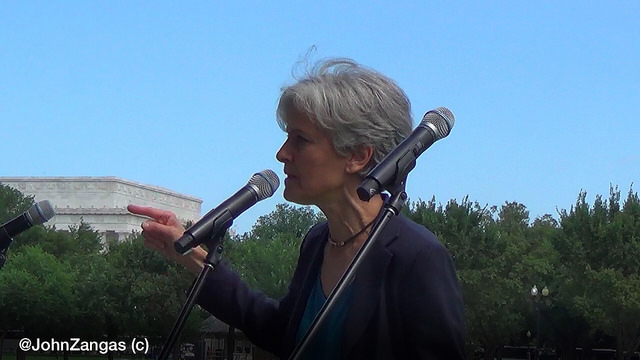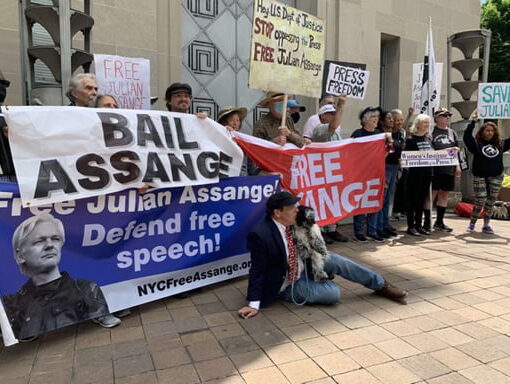
To commemorate the 50th anniversary of the passage of Medicare, advocates for universal healthcare rallied at the Lincoln Memorial, saying that the private insurance industry is raising costs for millions of Americans while worsening the quality of care. Key speakers included Dr. Jill Stein, Green Party presidential candidate, Dr. Robert Zarr, M.D., president of Physicians for a National Health Program, and Dr. Margaret Flowers, co-founder of Popular Resistance.
Since privatization of U.S. healthcare accelerated in the 1980s, millions have been left without care. Even under the Affordable Care Act (ACA), over 30 million remain uninsured. And for those with insurance, high medical costs are linked to sixty-two percent of all personal bankruptcies. Moreover, the private healthcare industry is too bureaucratic, spending over $210 billion annually in administrative costs, which funnels resources away from medical care itself.
Organizers advocated legislation which would provide a system of healthcare for everyone while saving billions of dollars. They said the legislation would prevent corporate for-profit medical lobby from undermining equality in healthcare by taking emphasis off profit.
Dr. Jill Stein said there are still over 35 million Americans without any healthcare despite the passage of the Affordable Care Act (ACA), and another 40 million with healthcare so costly, they can not afford care for serious chronic illnesses.

“Even under the Affordable Care Act… if you have a true chronic disease, there will be all kinds of holes in the plan,” said Dr. Stein. She said that the will to enact a just healthcare program was a political issue and laid responsibility for the lack of one at the feet of both the Democratic and Republican parties. “We need to hold the corrupt corporate parties accountable,” she said.
Dr. Robert Zarr, a board-certified pediatrician at Unity Health Care in Washington, DC, who cares for low-income and the immigrant population, works on the front lines with the uninsured and low-income workers who have been left out of the healthcare system. He said he witnesses the consequences of a broken privatized healthcare system every day. “I can write a prescription, but I have no guarantee my patients can fill it,” he said.
And the numbers back him up. The National Health Interview Survey showed many uninsured during 2014 were living at or near poverty.
“What it’s going to take to fix this problem is taking HR 676–expanded and improved Medicare for all–and pass it into law,” said Dr. Zarr. He urged physicians to get involved in the push for healthcare justice by organizing and supporting the bill.

Lack of a single payer affordable healthcare program is in effect creating austerity for those who already have healthcare, from higher costs and reduced care, said Dr. Margaret Flowers, a healthcare advocate who has worked on the single payer issue for over ten years.
“The U.S. is already spending twice as much per person on healthcare than most of the other industrialized countries,” said Dr. Flowers.
The Commonwealth Fund Mirror, an annual survey of healthcare in the top eleven Western nations, shows the U.S. has the most expensive per capita healthcare, but its health outcomes are the least effective. The U.S. has been trending last in five of the last ten years the report has been published (since 2004). The report showed the U.S. cost for healthcare averaging $8,500 per capita, while the average of 10 other countries was almost half that figure at $4,385 per capita.
Moreover, the report showed the U.S. was rated last in four of the eleven categories, including access, efficiency, equity, and healthy lives.
Dr. Flowers pointed out Americans don’t understand what they are missing, because they are so used to getting substandard care. Now, a single payer system is needed more than ever.
“People don’t know what healthcare justice means, they’re so used to a privatized system with barriers to care,” said Dr. Flowers. She believes educating others is the best tool available to achieving better healthcare. “There is a vibrant movement pushing for Medicare for all. That was the intention of Medicare from the beginning,” she said.





